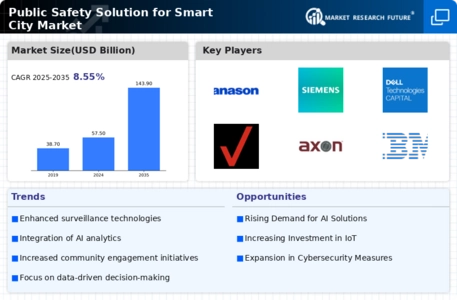Top Industry Leaders in the Public Safety Solution Smart City Market

Competitive Landscape of Public Safety Solutions for Smart Cities Market
The public safety solutions market for smart cities is a rapidly evolving space, propelled by the confluence of technological advancements and growing urbanization. As cities strive to improve public safety, optimize resource allocation, and enhance citizen well-being, the demand for integrated and intelligent solutions is surging. This has attracted a diverse range of players, creating a dynamic and competitive landscape.
Key Players:
- Harris Corporation
- IBM Corporation
- Cisco Systems Inc
- Schneider Electric SE
- Honeywell International Inc
- NEC Corporation
- Thales Corporation
- Northrop German Corporations
- Motorola Solutions Inc
- ABB Limited
- Ericsson Inc
- Emerson Electric Co
Strategies Adopted:
Competition in the public safety solutions market is fierce, with major players adopting various strategies to gain market share:
- Strategic partnerships: Companies are collaborating with leading technology providers, government agencies, and other stakeholders to develop and implement comprehensive solutions.
- Focus on specific sub-segments: Companies are identifying specific niches within the market, such as video surveillance, emergency response, or cybersecurity, to specialize their offerings and gain a competitive edge.
- Innovation and R&D: Continuous investment in research and development is crucial to stay at the forefront of technology and develop innovative solutions that address emerging needs.
- Market expansion: Companies are strategically expanding their global reach to tap into new markets and capitalize on the growing demand for smart city solutions.
- Focus on data analytics and AI: Leveraging data analytics and artificial intelligence (AI) to gain insights from sensor data and automate decision-making is a key differentiator.
Factors for Market Share Analysis:
Several factors are critical for analyzing market share in the public safety solutions for smart cities market:
- Market share by solution type: This includes video surveillance, access control, emergency response systems, cybersecurity solutions, and others.
- Market share by geography: Regional variations in smart city development and government initiatives impact market share distribution.
- Market share by customer type: The market can be segmented by city size, government agencies, and private entities.
- Market share by revenue: This provides insights into the financial performance of different players.
- Market share by market capitalization: This indicates the overall valuation of different companies in the market.
New and Emerging Companies:
Several new and emerging companies are disrupting the market with innovative solutions and agile business models. These companies often focus on specific niches, leverage cutting-edge technologies, and offer flexible solutions at competitive prices. Examples include:
- Cloud-based software providers: These companies offer SaaS-based solutions that are easy to deploy and scale, making them attractive to municipalities with limited resources.
- AI-powered startups: These companies are developing AI-powered solutions for video analytics, predictive crime mapping, and real-time incident response.
- IoT-focused companies: These companies offer specialized sensors and connectivity solutions for monitoring critical infrastructure and public spaces.
Current Investment Trends:
The public safety solutions market for smart cities is attracting significant investments from venture capitalists, private equity firms, and government agencies. These investments are fueling innovation, driving market growth, and propelling the development of next-generation solutions. Some key trends include:
- Focus on cybersecurity: With increasing cyber threats and vulnerabilities in smart city infrastructure, investments are shifting towards robust cybersecurity solutions.
- Integration of AI and IoT: Developers are focusing on integrating AI and IoT technologies into public safety solutions to enable automated incident detection, predictive analysis, and real-time response.
- Open-source platforms: Open-source platforms are gaining traction as they offer flexibility, interoperability, and cost-effectiveness compared to proprietary solutions.
- Focus on data privacy and ethics: As data collection and analysis become increasingly central to public safety solutions, concerns about data privacy and ethical considerations are gaining prominence, influencing investment decisions.
Latest Company Updates:
On July 19, 2023, Videonetics unveiled its latest AI-powered Unified Video Management Platform for the Southeast Asia Market at Secutech Vietnam 2023. Videonetics' unified video management platform meets the concept of a truly safe and smart city, providing tools to multiple agencies to solve real challenges beyond the basic need of monitoring for security purposes.
On Mar. 14, 2023, Business Technologies (IBTech) and Software AG announced a partnership to develop mission-critical public safety systems across the MEA region. The partnership follows the successful engagement of these two companies in a leading megacity project in Saudi Arabia.
Cumulocity IoT and webMethods Integration platform by Software AG power faster notification of emergency events, contributing to quick responses and enhanced safety for people. Moreover, the cutting-edge use cases will act as building blocks for smart cities, enabling innovative services for businesses and end users based on an ecosystem of fully connected enterprises.
On May 03, 2023, Nokia, a Finnish telecom gear maker, launched a 5G automated turnkey drone solution for public sector and industrial purposes. The Nokia Drone Networks solution connects public & private 4G/LTE and 5G networks to help enhance situational awareness for safety enablers, first responders, and other professionals. In the public safety sector, drones will be used by organizations working on smart cities, construction, energy, and defense.
On Aug. 22, 2022, Vodafone Idea (Vi), a telecom giant in India, announced its plan to focus on partnerships to boost its enterprise vertical. The firm has showcased real-world enterprise use cases in public safety in smart cities, Industry 4.0, smart healthcare, and smart construction, allowing emergency response using drones, improving sports coaching for high performance, OTT in cars, and driver safety monitoring in connected vehicles during its 5G trials.










